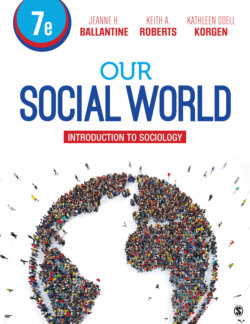Читать книгу Our Social World - Kathleen Odell Korgen - Страница 88
На сайте Литреса книга снята с продажи.
Ideas Underlying Science
ОглавлениеThroughout most of human history, people came to “know” the world by the traditions passed down from one generation to the next. Things were so because authoritative people in the culture said they were so. Often, there was reliance on magical, philosophical, or religious explanations of the forces in nature, and these explanations became part of tradition. For example, just 260 years ago, the conventional wisdom was that lightning storms were a sign of an angry god, not electricity caused by meteorological forces. As ways of knowing about the world shifted, tradition, religion, and magic as the primary means to understand the world were challenged. With advances in the natural sciences, observations of cause-and-effect processes became more systematic and controlled.
The scientific approach is based on several core ideas: First, there are real physical and social worlds that can be studied scientifically. Second, there is a certain order to the world, with identifiable patterns that result from a series of causes and effects. The world is not merely a collection of unrelated random events; rather, events occur in a systematic sequence and in patterns—that is, they are causally related. Third, the way to gain knowledge of the world is to subject it to empirical testing. Empirical knowledge is founded on information gained from evidence (facts), rather than intuition. Evidence refers to facts and observations that can be objectively observed and carefully measured using the five senses (sometimes enhanced by scientific instruments).
Consider the alternative to evidence. As early as middle school grades, children in some schools are asked to distinguish factual news stories from “fake news” stories, news that has little to no basis in facts that can be verified. Students are asked to look for half-truths, misinformation, and unsubstantiated claims by looking for the validity, accuracy, and reliability of information and sources. These are not always present in stories from Facebook, Twitter, and other social and news media sites (Barron 2017). For knowledge to be scientific, it must come from phenomena that can be observed and measured. Phenomena that cannot be subject to measurement are not within the realm of scientific inquiry. For example, what religion is “best” or the existence of God, the devil, heaven, hell, and the soul cannot be observed and measured and therefore cannot be examined scientifically. Religion, however, can be studied scientifically by looking at the role it plays in society and our lives, its impact on our values and behavior (the sociology of religion), the historical development of specific religious traditions (the history of religion), or the emotional comfort and stability it brings to people (the psychology of religion). Finally, science is rooted in objectivity; that is, one must take steps to ensure that one’s personal opinions or values do not bias or contaminate data collection and analysis. Scientists are obliged not to distort their research findings so as to promote a particular point of view. Scientific research is judged first on whether it relies on careful efforts to be objective. Social scientists, like all scientists, must explain what the data reveal, not what they wish it would reveal! Researchers must be open to finding results that support or disprove their hypothesis (an educated guess or prediction) about the research being conducted.
Failure to meet these standards—empirical knowledge, objectivity, and scientific evidence—means that a study is not scientific. Someone’s ideas can seem plausible and logical but may still not be supported by the facts. This is why evidence is so important. Sociology is concerned with using accurate evidence, and it is important to know what is or is not considered accurate. Perhaps you have seen an episode of Law and Order, Criminal Minds, NCIS, or Elementary on television. These series depict the importance of careful collection of data and commitment to objective analysis. Sociologists deal with different issues, but the same sort of concern for accuracy in gathering data guides their work. When sociologists establish theories as to why society works as it does, they must test those theories using scientific methods.
